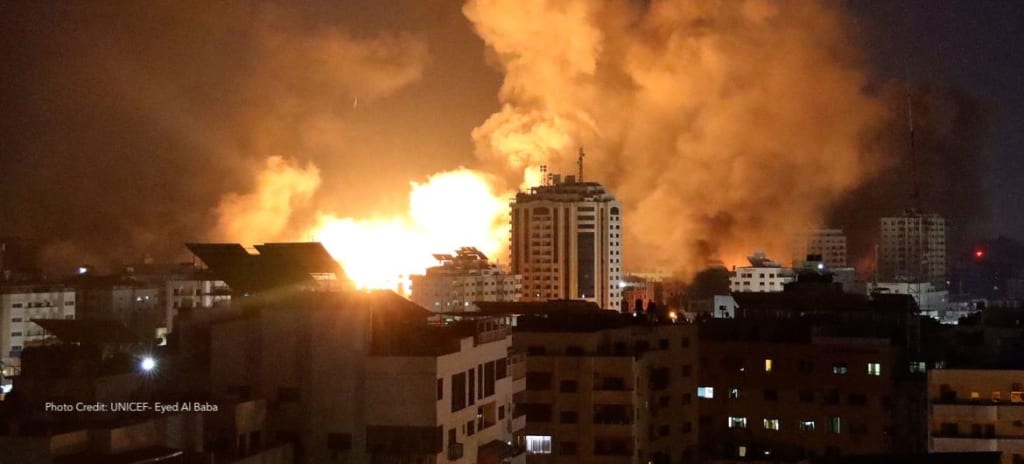Gaza Crisis, Human Rights and International Law
The Gaza crisis has captured everyone’s attention over the past couple of weeks. Find out why the roots of the conflict, and its solutions, lie in all parties understanding and respecting universal human rights.

Everyone I’ve spoken to recently is reeling from the horrific events of the Gaza Crisis. We’re seeing sickening images of what Robbie Burns called “man’s inhumanity to man” in every newscast.
Instead of rehashing the military news, we’d like to look at the Gaza crisis from a human rights perspective. As in most violent conflicts, it’s the innocent who’ve been paying the price for the misguided ambitions of political and military leaders on all sides.
The movement toward recognizing universal human rights arose from the horrors of the Second World War, particularly the Holocaust. There was a growing realization that international law must recognize that everyone, regardless of nationality, race or religion is entitled to certain fundamental rights based on their basic worth as a person.
“Acts Which Have Outraged the Conscience of Mankind”
As the Universal Declaration of Human Rights puts it, “Disregard and contempt for human rights have resulted in barbarous acts which have outraged the conscience of mankind.” Among other atrocities, the declaration was referring to the genocide committed by the Nazis against the Jewish people.
The State of Israel arose from that expanding human rights movement. Both the signing of the Universal Declaration of Human Rights and Israel’s founding took place in 1948.
The international community wanted to provide a safe haven for Jews fleeing persecution. Creating the new state in what was then Palestine recognized a homeland to which the Jewish people have always felt profound cultural ties.
Majority of the People in the Region Were Arab Palestinians
Although there were always Jewish communities in Palestine, the majority of the people in the region at that time were Arab Palestinians. Most of them were Sunni Muslims, but many of them were Christians as well.
War broke out throughout the Middle East on Israel’s very first day of existence. Along with the Arab Palestinians, Egypt, Jordan, Syria, Lebanon and Iraq refused to recognize Israel’s right to exist, and they launched a coordinated military invasion to destroy the new country.
That war continued until 1949, with Israel ending up with more territory than it had before the invasion. The conflict left over 700,000 Arab Palestinians homeless, living as refugees in Egypt, Jordan, Lebanon and Syria.
Six-Day War Ended With Israel Occupying Gaza
The well-known Six-Day War in 1967 ended with Israel occupying still more land. This included the narrow strip of land on the Mediterranean coast called Gaza, among other territories.
Gaza had been part of Egypt, but Israel would occupy it for the next four decades.
The Six-Day War displaced another 300,000 Arab Palestinians and 100,000 Syrians from their homes.
Israel withdrew from Gaza in 2005, although it maintains land, air and sea blockades to cut the region off from the rest of the world. Human Rights Watch has called Gaza an “open-air prison.”
More Than 80% of Gaza’s People Live in Poverty
More than 80% of Gaza’s people live in poverty, almost half of the work force is unemployed amid an ongoing mental health crisis. In 2007, through a combination of questionable political and military maneuvers, a group of violent Arab Palestinian extremists called Hamas gained control of the troubled Gaza Strip.
Hamas is funded by Iran, and it refuses to even engage with the Israeli government. The militant group constantly attacks Israel and this Gaza crisis is Hamas’s third major war against Israel.
The US, Canada and the European Union have designated Hamas a terrorist organization.The International Criminal Court’s (ICC’s) chief prosecutor has said that the ICC has jurisdiction over atrocities that either Hamas or Israel commit during the Gaza crisis.
‘Grave Breaches of the Geneva Convention’
"One cannot deliberately target civilians or civilian objects. One can't rape or kill, or mutilate or dismember,” Prosecutor Karim Khan told Reuters. "Wilful killing, hostage taking are grave breaches of the Geneva Convention and one has to comply with the law.”
Meanwhile, the UN High Commissioner for Human Rights reports that Israel’s “continued siege on Gaza is affecting water supply, food, medicine and other basic needs, and there are daily indications of violations of the laws of war and international human rights law.”
At the same time, he called for “Palestinian armed groups to immediately and unconditionally release all civilian hostages, and to halt the use of inherently indiscriminate projectiles against Israel.”
Four Primary Human Rights Issues
Stepping back from the current Gaza crisis, four primary human rights issues overshadow the whole Arab-Israeli conflict. These are the two-state solution, Israeli settlements, Jerusalem and refugees.
Hamas is bound and determined to wipe out the State of Israel. Israel’s prime minister, Benjamin Netanyahu, pays lip service to a two-state solution, but many doubt his and his political party’s sincerity about accepting any Palestinian state’s right to exist.
Palestinians and observers are sceptical about Netanyahu’s intentions because Israelis keep building new Jewish settlements in the occupied territories. These settlements violate the Geneva Convention, UN Resolutions, a Red Cross declaration, and an International Court of Justice opinion.
Both Sides Refuse to Share Jerusalem
On the Jerusalem issue, when the international community first established the State of Israel, the plan was to have “a special international regime in the City of Jerusalem, under the administration of the United Nations.” That’s never happened, and both sides refuse to give up or even share the city.
Today, there are about 5.6 million Palestinian refugees. Roughly 2 million of them, mainly women and children, are crammed into Gaza, while others live in the West Bank, Jordan, Lebanon and Syria. Human rights law says “everyone has a right to a nationality,” yet most of these people are stateless and stranded in makeshift camps.
These refugees want to return to their homes. Israel’s government won’t allow this, even though many Israelis are descendants of people who fled to Israel to escape similar circumstances.
And Another Thing…
To find a long-term solution to this conflict, the region needs a new generation of leaders on all sides guided by a new story based on the value of human life, and humanity’s unity in diversity. Until politicians learn to value the well-being of all parties involved, the current turmoil will never end.
Christians, Jews and Muslims all have deep historical, cultural and spiritual connections to the battlegrounds where the Gaza crisis is raging. Yet, they all blindly view those ties to the land as separate, when they’re profoundly interwoven.
As UN Secretary General Antonio Guterres explained, “Only a negotiated peace that fulfills the legitimate national aspirations of Palestinians and Israelis, together with their security alike, can bring long-term stability to the people of this land and the wider Middle East region.”
We always have more to learn if we dare to know.
Learn more:
Amnesty International – State of World’s Human Rights
About the Creator
David Morton Rintoul
I'm a freelance writer and commercial blogger, offering stories for those who find meaning in stories about our Universe, Nature and Humanity. We always have more to learn if we Dare to Know.
Reader insights
Outstanding
Excellent work. Looking forward to reading more!
Top insights
Expert insights and opinions
Arguments were carefully researched and presented
Eye opening
Niche topic & fresh perspectives
On-point and relevant
Writing reflected the title & theme






Comments (1)
This comment has been deleted
Interesting article